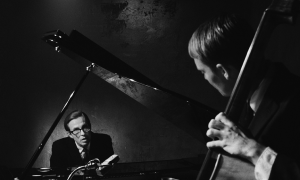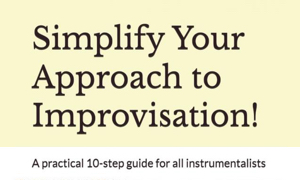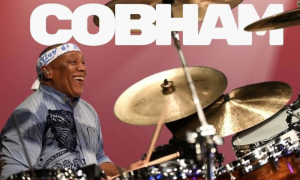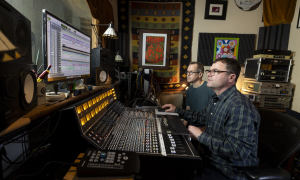Precious Commodity (Shackrobeat Records) maps how far the high-energy eleven-piece Bay Area band has traveled from Afrobeat worshipers to innovative and mature collective, and points to a radical new direction for North America's burgeoning Afrobeat scene. Where once careful attention to the tradition sparked by Nigeria's Fela Kuti reigned supreme, now musicians are madly pursuing their own visions for the music-and creating traditions of their own.
Groups from Aphrodesia to Nomo to Antibalas side project Ocote Soul Sound are reclaiming Afrobeat's outspoken political platform and transforming it into intimate personal statements and more subtle critiques and explorations of American life. “We learned the term 'Special Girl' from a friend who had just returned from Shanghai on business," explains singer and songwriter Lara Maykovich. “He was offered, a special girl, a prostitute. The song is the story of this trans-continental sex trade, a kind of mockery of this old game where man thinks he is winning. Power and money are evidently not the final quench. The thirst is satisfied by a more precious commodity. Sex, our most powerful possession and that which connects us to the unstoppable nature that man will never control. We began to think about the West's misconceptions on what is of value. The fear-driven mass of consumption, our denial of death that obstructs us from seeing what is truly precious."
The personal approach also translates into new musical dimensions. “Sonically, our music has become much more varied than in the past. And this album broadens and strengthens what we have been building on," recounts Aphrodesia bassist and songwriter Ezra Gale. “It was a conscious decision, really getting more creative and going for different sounds, discovering a much more diverse palette of instruments and sonic surprises."
The group's palette has expanded to include studio high jinks and the once verboten guitar solo. Inspired by Konono No. 1's unwittingly revolutionary rethinking of the thumb piano, Gale took a musical idea that came to him while strolling through the overjoyed Mission District on Obama's election, had singer Lara Maykovich play an mbira she had picked up in Zimbabwe, and then ran it through a huge bass cabinet and three guitar amps cranked so loud the studio's walls shook ("November 5 I & II").
“For a long time we have had two guitar players, but a rule of no guitar solos," Gale notes. “There's just no room for them in Afrobeat's interlocking guitar parts, and we wanted to respect the tradition." The longing to respect the music they loved took the band a few years ago on a wild bus tour across Togo, Benin, and Nigeria in a dizzying series of car chases, cassette bribes, and finally, an unforgettably warm reception at Afrobeat heir apparent Femi Kuti's Lagos club. The experience solidified Aphrodesia's sound, built on members' past sojourns in Ghana and Cuba, that melded Afrobeat and Yoruba chants to the orisha spirits ("Ayala" and “Caminando").
“As lyricists we carefully consider our invocations and intentionally apply them to our current political world struggles and our own fractured American reality," explains Maykovich. “Since the voice of suffering is universal and passion is interchangeable, we don't consider this a borrowed tradition. It's one of themany traditions of mystery spiritual being have originated from."
With their African mecca behind them, the band was ready to take the next step, which included lifting the long-standing guitar solo ban. “It was really funny: We played this one gig a redneck bar in woods near Santa Cruz, and the sound guy, as he was packing up, said 'I ain't never seen a band with two guitarists and no guitar solos.' On this album we have three, and they are all awesome," Gale smiles. “To us, it was just another symptom of us opening up and looking for different things." Things like a noise guitar solo jolting through the pop smoothness of “Think/Suffer" where guitarist Mike Abraham strives to “avoid any and all notes," Gale laughs.
Aphrodesia has expanded geographically as well as musically, with several members relocating from the Bay Area to New York. The move had an unexpected effect: Instead of undermining the band's work, they found that it opened up their music to new post-production approaches and a new Big Apple vibe. “We had something we haven't had before, a diversity of feedback and viewpoints in the studio, because in New York, all these talented people will just stop by the studio and listen," people like Gale's friends from the Blue Man Group who gave Gale input on several tracks. “It's a product of working somewhere where you have to drive like California versus New York, where you walk down the block and bump into people," Gale muses. The change of scene and long-distance music making -- an amazingly seamless process thanks to MP3s -- has brought Aphrodesia's creativity into sharp focus.
This creativity still embraces the grooves that moved Aphrodesia from day one. Straight-up Afrobeat goodness overflows on “Merit Badge," a tribute to the band's humorous praise of members who receive imaginary merit badges for figuring out how to fix the tour bus or managing to give a stellar performance in the throes of severe illness. “Friday Night," a palm wine song of frustrated love, came to the band from Obuobi Ashuog, the guitarist for Ghanaian friends Kusun, who takes a solo on the track.
Yet old orthodoxy and new spins merge on Precious Commodity. The funk and r&b call to wake up to the world around you, “Make Up Your Mind," mixes Yoruba and Afro-Cuban chants with English lyrics and a guitar solo run through a whirling Leslie speaker salvaged from a Hammond organ. “By the Iron" winks at prog rock by adding lush strings to a Malian song and English incantation interwoven by Maykovich.
Aphrodesia's new twist on a beloved approach shines brightest on the intro and outro tracks -- “November 5" -- that frame the album and feature the distorted mbira. The reworking of the track and its transformation in the New York studio where Gale put the finishing touches on the album represent a meaningful departure for the group. “I'm fascinated by the prospect that a song is not necessarily finished when it's played and recorded. Aphrodesia has been more of a straight-ahead band, but this track is a different way to use the studio, a different way to think about recorded music that's all around us now," Gale reflects.
“I think because we are a younger white band, we felt like we needed to prove ourselves. We really wanted to do things right and give the music respect, and going to Africa was part of that," explains Gale. “We feel like we have done that, though of course we're always learning. But there is a feeling that we have gone down that path of trying to do everything authentically, now it's time to embrace our own sound."
For more information contact All About Jazz.

























